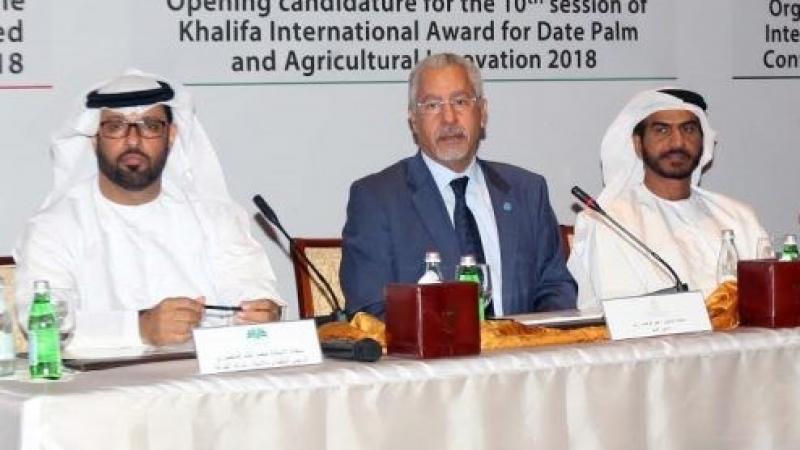Khalifa International Date Palm Award for ICARDA Director General, Dr Mahmoud Solh

Dr. Mahmoud El Solh, ICARDA’s Director General, along with other international dignitaries, was honored during the official launching of the Khalifa International Award for Date Palm and Agricultural Innovation (KIADPAI) in Abu Dhabi on 15 March 2016. It marked a turning point in the efforts of the United Arab Emirates (UAE) to boost agriculture and date palm research and innovation. The 2016 edition of the award saw a change in the initiative from previous years, with higher emphasis on innovation.
Originally launched in 2007 as the Khalifa International Date Palm Award by His Highness Shaikh Khalifa Bin Zayed Al Nahyan, President of the UAE, the initiative aims to support scientific research and development in the date palm and agriculture sectors, and to showcase the UAE’s efforts towards that goal. Since then, hundreds of participants from around the world, including researchers, growers, exporters and institutions, have taken part in the initiative. Hence, it has become the most prominent award in the date palm agriculture and industry.
“Undoubtedly, this unique scientific award, would add a new brick, create a quality leap and inaugurate a new phase at the level of agricultural innovation and development of the date palm sector at the Arab and international levels,” said Shaikh Nahyan Mubarak Al Nahyan, Minister of Culture and Knowledge Development, at the official launching ceremony of the award.
Addressing a large number of guests, including Dr. Mahmoud El Solh, Director General of ICARDA, Jose Graziano, Director-General of the United Nations Agriculture and Food Organization (FAO) and other senior officials and diplomats, the minister pointed out that research into new innovative methods for agricultural production was crucial to achieve food security.
“We hope that the KIADPAI would contribute to finding solutions and outlets for many of the problems facing the agricultural sector, so as to ensure achievement of the highest productivity standard of all agricultural crops and contribute to providing food to the greatest number of the world population,” he said. The minister also mentioned the accomplishments realized by the Award in advancing the date palm sector of the past eight years. Research has contributed to a noticeable increase in date palm production over the past few years in response to an increased demand stimulated by a greater awareness of the nutritional value of dates.
In spite of their high sugar content, dates or phoenix dactylifera offer indisputable health benefits and a potential to combat hunger and food insecurity, which can hardly be overlooked. Increased cultivation of date palms in arid lands and dry climatic conditions has a significant environmental impact.
As a rich energy source (248 per 100 gram), dates are high in dietary fiber and contain more potassium than bananas. Virtually fat, cholesterol and sodium free, dates provide essential vitamins, nutrients and minerals such as B-complex vitamins, magnesium and iron. In addition, dates have antioxidant, anti-infective, anti-inflammatory and anti-hemorrhagic properties.
Speaking at the launching ceremony, the Director General of ICARDA, Dr. Solh, underlined the importance of the award in advancing the research agendas, especially those related to palm dates, given the health and environmental benefits of this crop as well as its contribution to food security. He reiterated that “the UAE has become a center of attraction for specialists, innovators and agricultural investors thanks to the organization by the government of several events and international exhibitions related to the development of agricultural production and innovation.”
Dr. Solh indicated that ICARDA has had a long history of research work on date palm crops and related pest management programmes. Among several others, ICARDA’s “Developing Sustainable Date Palm Production Systems in the Gulf Cooperation Council Countries”; “Arabian Peninsula Regional Program (APRP)”; and “Raising Date Palm Production through Sustainable Pest Management” have yielded a considerable amount of concrete achievements over the past twenty years.
